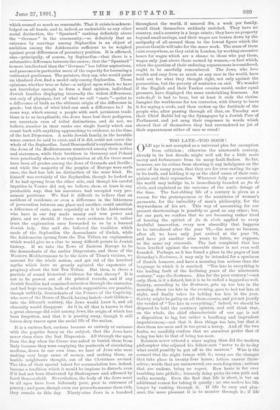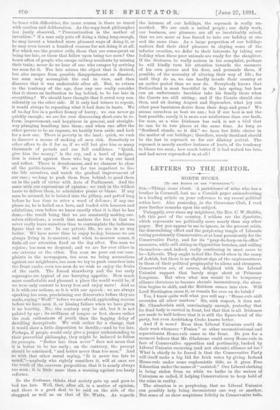TOO LATE—TOO SOON!
OLD age is not accepted as a universal plea for exemption
from criticism ; otherwise the nineteenth century, already in its last decade, might well ask for a little more mercy and forbearance from its many fault-finders. So far, however, are its critios from showing it any indulgence on the score of its many years, that they are for ever casting its age in its teeth, and holding it up as the chief cause of their com- plaints and their reproaches. Whatever folly or eccentricity the world may indulge in, is immediately branded as fin de siècle, and explained as the outcome of the senile dotage of the time. The fast-ebbing life of a century is given as a reason for the grotesqueness or the scantiness of woman's garments, for the imbecility of man's philosophy, for the waywardness of his art. This way of accounting for our present shortcomings is possibly as good as any other; but, for our part, we confess that we are becoming rather tired of hearing the epithet of fin de sada applied to every doubtful innovation, every new absurdity that happens to he introduced after the year '91,—the more so because, after all, we have only just arrived at the year '91, and have yet another nine years to listen, we suppose, to the same cry crescendo. The last complaint that has been levelled against the venerable sinner is not even well founded. Perhaps, as it has found a place in the pages of last Saturday's Scotsman, it may only be intended for a specimen of Scotch humour, and have a meaning less serious than the language in which it is couched. "Too late in everything is the leading fault of the declining years of the nineteenth century," says the Scotsman. Alas for the poor century ! —not only, then, is it a dotard, but it is to be called a laggard as well. Society, according to the Scotsman, gets up too late in the morning, dines too late in the evening, goes to bed tod late at night, and finally takes its holiday too late in the year. Society might be guilty on all those counts, and yet not justify the verdict of "Too late in everything ;" indeed, we should be disposed to hold the contrary opinion, and still think that, on the whole, the chief characteristic of our ago is not a disposition to lag, but rather a headlong and imprudent impulsiveness,—not that it does things too late, but that it does them too soon and in too great a hurry. And of the two faults, we candidly confess that we ourselves prefer that of being too late to that of being too soon.
Solomon never uttered a wiser saying than did the modern philosopher who adjured his fellow-men "never to do to-day what could possibly be put off to the morrow." Wise is the counsel that the night brings with it ; many are the changes that take place in twenty-four hours ; letters answer them- selves; words that are unanswered, are soon forgotten ; actions that are undone, bring no regret. Raw haste is for ever tumbling into pitfalls ; leisurely delay picks its own path and walks serenely. Even the fact that life is short, is but an additional reason for taking it quietly : no one makes his life longer by rushing through it. If life be easy and plea- sant, the more pleasant it is to saunter through it ; if life be beset with difficulties, the more reason is there to travel with caution and deliberation. As the copy-book philosopher has justly observed, " Procrastination is the mother of invention:" if a man only puts oil doing a thing long enough, he may invent a hundred more pleasant ways of doing it, or he may even invent a hundred reasons for not doing it at all. For which are the greater evils, those that are consequent on being too late, or those that follow upon being too soon ? One hears often of people who escape railway accidents by missing their train; never do we hear of one who escapes by arriving too soon for it. Too late misses the object that it desired, but also escapes from possible disappointment or disaster; too soon may accomplish the end in view, and then discover that it was undesirable after all. But, to return to the tendency of the age, does any one really consider that it shows an inclination to lag behind, to be too late in everything? We should have thought that it erred very con- siderably on the other side. If it only had leisure to repent, it would always be repenting what it had done in haste. We of to-day live in a perfect frenzy of hurry ; we can never go quickly enough; we are for ever discovering short-cuts to re- form, improvement, and happiness in general, and straight- way plunging headlong into them; and when one after the other proves to be an impasse, we hastily turn aside and look for a new one. There is poverty in the land : quick, we rush to discover a means of making all men rich. Somebody or other offers to do it for us, if we will but give him so many thousands of pounds and our full confidence. "Quick, give him the money," is the cry, and a howl of indigna- tion is raised against those who beg us to stay our hand and reflect. There is drunkenness, and we clamour to close all the public-houses. We are far too impatient to live the life ourselves, and watch the gradual improvement of our race ; we long to push them from behind, to goad them on in the path of virtue with Acts of Parliament. And the same with our expressions of opinion.: we rush in the wildest haste to deliver them, to administer praise or blame. If any man be accused, he is hoisted into the pillory, and pelted long before he has time to utter a word of defence ; if any one please us, he is hailed as a hero, and loaded with honours and adulations, even before we know exactly what it is that he has done,—the result being that we are constantly making our- selves ridiculous ; a result that matters the leas in that we never really leave ourselves time to contemplate the ludicrous figure that we out. In our private life, we are in no way better. We have never time to enjoy to-day, because we are always living in to-morrow; and when to-morrow comes, it finds all our attention fixed on the day after. Too soon we rejoice; too soon we despond; and we are for ever either in one extreme or the other. Too soon we pour out our com- plaints in the newspapers, too soon we bring accusations against our neighbours, too soon we try to push ourselves into the front ranks, even too soon do we wish to enjoy the fruits of the earth. The forced strawberry and ' the too early asparagus are typical of our hurrying appetite. How much more comfortable and pleasant a place the world would be, if we were only content to hurry less and enjoy more And as it is with our actions, so it is with our speech : we are always speaking too soon, proclaiming our discoveries before they are made, crying "Wolf!" before we are afraid, applauding success before we have seen it, or hissing failure when we have given it no hearing. No; the century may be old, but it is not palsied by age ; its swiftness of tongue or feet, shows rather the rash enthusiasm of youth than the lagging delay of dawdling decrepitude. We wish rather for a change, that it would show a little disposition to dawdle,—and be too late. Perhaps, if people would only give a proper understanding to their proverbial philosophy, they might be induced to follow its precepts. "Better late than never" does not mean that it is better to be too early ; on the contrary, the precept should be continued, "and better never than too soon." And so with that other moral saying, "It is never too late to mend,"—anybody who rightly considers it, will at once see the truth of the converse proposition, that it is nearly always too soon: it is little more than a warning against too hasty reforms.
So the Scotsman thinks that society gets up and goes to bed too late. Well, that, after all, is a matter of opinion, and there is a good deal to be said on the side of the sluggard as well as on that of Dr. Watts. As regards the lateness of our holidays, the reproach is really un- merited. We are such a united people ; our daily work,. our business, our pleasure, are all so inextricably mixed, that we are more or less forced to take our holiday at one and the same time. As a large proportion of our holiday- makers find their chief pleasure in slaying some of the inferior creation, we defer to their interests by taking our holiday when these poor animals are ready for the slaughter.. If the Scotsman be really serious in his complaint, perhaps he will kindly turn his attention towards the manners of his own grouse and his deer, and persuade them, if possible, of the necessity of altering their way of life ; for until they do so, we can hardly invade their country at an earlier period than we now do. Everybody knows that Switzerland is most beautiful in the late spring, but how can an unfortunate barrister take his family there when the Courts are still sitting ; and if the Courts should rise then, and sit during August and September, what joy can other poor barristers derive from their dogs and guns ? We amuse ourselves as best we can ; but if our best is not the- best possible, surely it is more our misfortune than our fault, for man, as a wise Irishman has said, is not a bird that he can be in two places at the same time. As long as "Scotland stands, as it did," we have but little choice in the matter of our holidays ; therefore, surely Scotland should be the last to reproach us for our dilatory arrival. The- reproach is merely another instance of haste, of the tendency to blame too soon ; how much better if it had waited too late,. and had never reproached us at all !



































 Previous page
Previous page